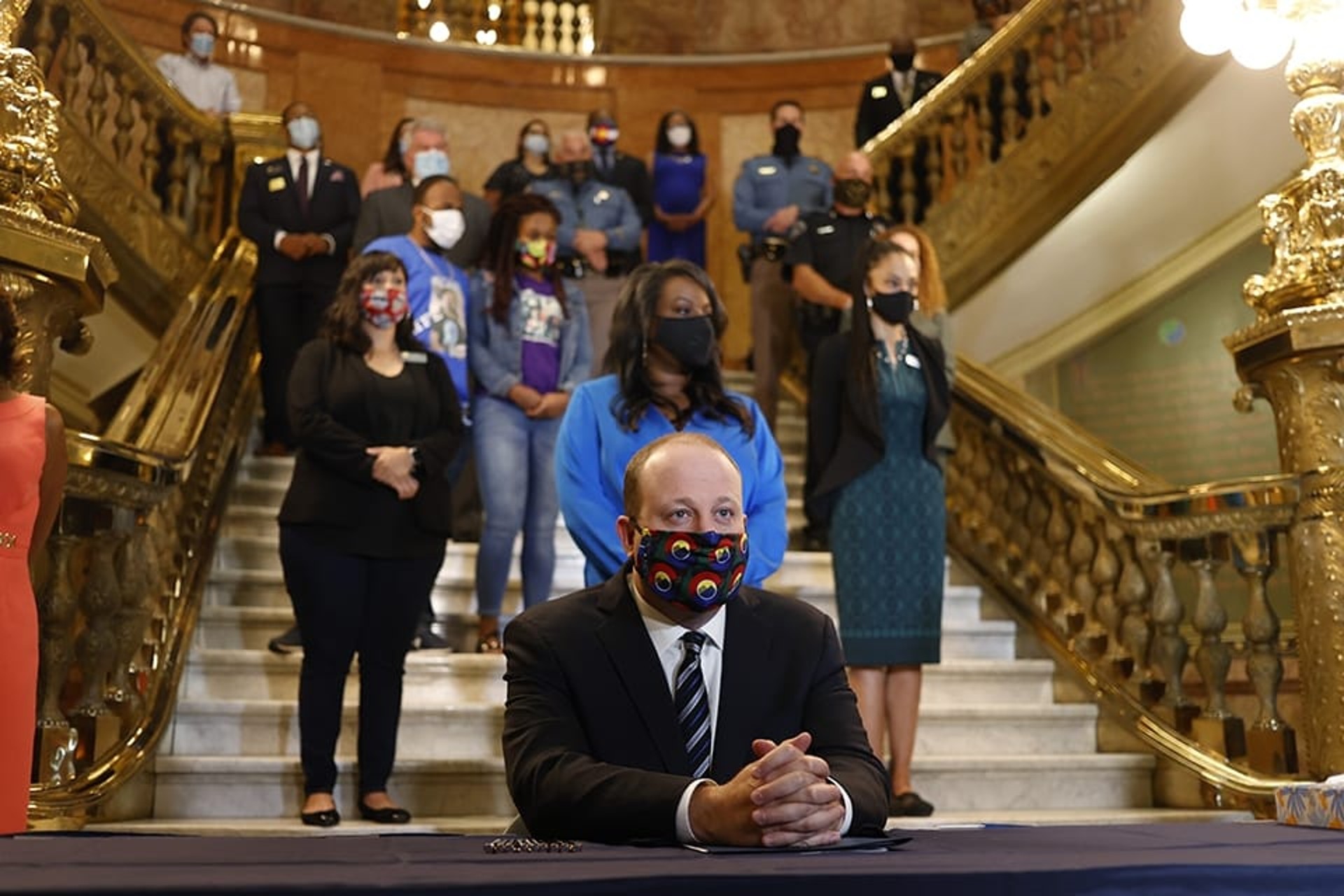Memo Published October 8, 2020 · 8 minute read
What is Qualified Immunity & Why Does It Need Reform?
Nathan Kasai & Robert Cotter

The nation’s overdue reckoning with racial justice this summer has brought many aspects of our policing methods and accountability (or lack thereof) into focus. Practices and laws once deemed acceptable or tolerable are rightfully being scrutinized for their true impact, putting a spotlight on a previously obscure doctrine called qualified immunity which for decades has stood as an obstacle to justice for victims of police violence.
In a time of renewed momentum for criminal justice and policing reform, Members of Congress from Representative Justin Amash (I-MI) to Senator Cory Booker (D-NJ) have called for a fundamental overhaul of qualified immunity. Here, we explain what qualified immunity is, what its impact has been, and how it could be reformed to better serve justice for all Americans.
What is Qualified Immunity?
Qualified immunity is a rule that limits personal liability for police officers for conduct they undertake on the job. It governs the money damages victims of police misconduct or abuse might be able to obtain through the civil courts. It does not address whether police officers are subject to criminal liability for their conduct.
The doctrine was originally created by the Supreme Court to shield government officials from novel legal claims, under the theory that the threat of personal liability would hamper efficient governmental service. In 1982 the Court created a 2-part test to determine if an official, including but not limited to a law enforcement officer, would be shielded from a lawsuit for wrongdoing on the job. In order to be held personally accountable in civil court, the Court ruled that both factors of the following test must be satisfied:
- The alleged facts of the case show the official violated a constitutional right; and,
- The illegality of the conduct of the official has been “clearly established.”1
The second part of the test was intended to bar private lawsuits bringing cases for constitutional violations that had not been previously acknowledged by U.S. courts. The original idea was that if enough cases were filed but failed under qualified immunity, courts would eventually allow them to succeed under this test because they then would be “clearly established” to the point that any reasonable government official would know that such conduct was would expose them to personal liability. But in practice, this test has made it nearly impossible to sue a government official for something if there isn’t already a long record of past successful lawsuits with the same fact pattern. This creates a catch-22 scenario where in order to succeed in suing an official, someone had to have successfully sued before them, which qualified immunity almost always now prevents.
This test has led to grave injustices over time. In just one recent example, Malaika Brooks was seven months pregnant when police officers stopped her for allegedly speeding while driving her 11-year-old son to school. After she refused to sign the ticket officers issued her, believing that she had been wrongly pulled over and mistakenly believing that her signature would serve as an admission of guilt, two officers twisted Malaika’s arm behind her back, tased her three times, and dragged her face down into the street.2 She later sued the officers, but even though the court determined that excessive force was used, it also ruled that they could not be held accountable because no similar case had clearly established the illegality of their actions.
In other instance, Amy Corbitt was sitting in her yard with her son when officers came onto the property in search of a suspect she had never met before, and they shot twice at the family dog. Both shots misfired, but the second struck Amy’s 10-year-old son in the knee causing a serious gunshot wound and mental trauma.3 Again, her case failed because no case before had dealt with the same specific circumstances as hers, even though the court also found there was no justified reason for the officers to fire their weapons.
In these cases, the individuals involved sued, and a federal court determined that their constitutional rights were violated. However, in both cases it was determined that the illegality of the abuse they suffered wasn’t sufficiently established by previous successful cases, and so the lawsuits were dismissed. These cases aren’t outliers either. There are thousands of cases like these across America every year.4 And now that the second prong of the qualified immunity test is being interpreted as essentially a blanket bar on suing a government official, no case can win to begin to establish a series of successful cases on which others can rely.
What Changes are being Proposed?
Both state and federal officials have begun to recognize the injustice of the current iteration of the qualified immunity doctrine and work to change it. Colorado recently enacted changes to qualified immunity in a broader package of police reform, becoming the first state to do so immediately after the death of George Floyd in Minnesota. The new Colorado law eliminates qualified immunity as a defense in state court, but it also includes some financial protections for law enforcement officers. It requires state and local police departments to pay the legal costs arising out of most cases so long as the officer was acting in good faith, protecting well-intentioned law enforcement officials from personal financial ruin.5 It also capped liability at $25,000. Colorado police unions opposed the inclusion of the immunity changes in the reform package but stayed neutral on the bill as a whole and have even spoken positively about the broader changes the law is making, noting that the package will help ensure better policing and increase the ability of local departments to remove bad apples.6
At the federal level, the Justice in Policing Act, which was passed in the House in June 2020 by a vote of 236 to 181, would change qualified immunity for police officers, affecting both state and federal law enforcement officers. This bill eliminates the defense in the second part of the test discussed above; that the right violated under the Constitution or law was not clearly established.7 Importantly, this would not create new rights or illegal conduct under the law, it would simply allow victims to obtain relief in civil court if they can prove that their Constitutional rights have been violated.
What Would the Impact Be of these Changes?
Reforming qualified immunity wouldn’t open door to financial ruin or endless lawsuits for police officers. For starters, qualified immunity already does a poor job of shielding officers from the most tedious parts of a lawsuit. A study of the qualified immunity defense found that in the vast majority of cases, 62the police officer only succeeded after months of court proceedings and hearings. The officers and their lawyers are still defending against these cases, the only difference is that thousands of individuals are unable to receive compensation, even when courts agree the officer violated their rights.8 And the actual personal financial risk to individual officers appears to be minimal. One study estimates at 99.8% percent of all lawsuits filed against law enforcement individually are paid by government because of indemnity laws. Moreover, reforms modeled after those in Colorado could include the same requirement that departments cover costs in most cases, protecting victims of misconduct much better than current law.9
Who’s Backing Changes to Qualified Immunity?
A broad coalition across the political spectrum supports reforming qualified immunity, and not just from one end of the political spectrum. In 2018 criminal justice organizations, libertarians, and even the Koch brothers urged the Supreme Court to reconsider the current qualified immunity doctrine. And importantly, they were joined by the law enforcement organization Law Enforcement for Action Partnership.10 Even conservative Supreme Court Justice Clarence Thomas cast doubt on qualified immunity as a judicially created overreach while liberal Justice Sotomayor described the doctrine as a policy of “shoot first, ask questions later.”
And the original House bill to alter qualified immunity was coauthored by former Republican libertarian Representative Justin Amash (MI) and Democratic Representative Ayana Pressley (MA). From civil rights activists to civil libertarians, a broad range of Americans increasingly believe we should change our laws around qualified immunity. Most voters also agree with reforms to qualified immunity. 63% say that it should be reformed, including 58% of Republicans 64% of Independents.
Conclusion
Qualified immunity stands between the American people and accountability. The balance originally intended in the doctrine has been warped into a blockade of justice and the growing consensus is that it is time to change qualified immunity. Reforming qualified immunity is the commonsense and mainstream policy position in policing reform.

